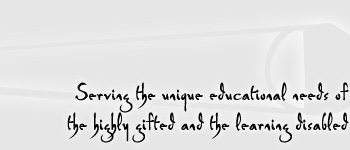














What is twice-exceptionality?
Very simply, giftedness does not immunize a person against any other problems. A twice- (or multiply-) exceptional person displays both giftedness and one or more of the following:
- learning disability (e.g., dyslexia, dysgraphia, dyscalculia, nonverbal learning disability)
- language-based learning disability (e.g., expressive or receptive language disorders)
- autism-spectrum disorders (e.g. Asperger’s Syndrome)
- other cognitive disorders (e.g. ADHD, executive functioning disorders, sensory processing disorders, apraxia)
- other psychological disorders (e.g. anxiety, depression, bipolar disorder, OCD, phobias)
- physical disorders (e.g. visual or hearing impairment, orthopedic impairment, medical disorders)
Gifted individuals who are also second-language learners, although not generally considered twice-exceptional, often experience many of the same challenges, and often benefit from the same thoughtful approach.
The basic problem can be summed up as, “Two wrongs don’t make a right.” Often, the needs of a twice-exceptional individual are not recognized, understood, or met because:
- the effects of the disability mask the manifestation of giftedness, or command so much attention that giftedness is not viewed as an important consideration
- giftedness and strong motivation (often accompanied by support from others) enable them to mask the signs of their disabilities
- both giftedness and disability mask each other, and the person appears to be ordinary.
When there is a concern that an individual may be twice-exceptional, both assessment and program development must be carried out with a great deal of thoughtfulness and care.
In assessment, we have to consider alternate possibilities, such as the idea that a person might just not be as smart as we thought they were, or that they might have strengths and weaknesses that reflect normal individual variation -- not everyone is good at everything. There are no easy answers to these questions. Numerical scores have to be interpreted in context, and we look for consistent patterns, both in terms of how scores compare to each other, and how test performance compares to real-life performance. Often, the focus is less on putting a name to something, and more on carefully describing what we’re observing.
When thinking about how to help a twice-exceptional learner in a classroom, we have to balance their various needs. Gifted kids with learning disabilities often have high conceptual understanding and strong desire to learn, but struggle with the fundamental skills needed for success. Sometimes they need to be given accommodations or modifications to the expectations, to enable them to participate in the learning experiences that they can otherwise derive real benefit from. I don't believing in holding all learning hostage to the one thing the kid is having trouble with. At the same time, we need to find ways to help the kids learn those basic skills, even if it might not always be the most fun or interesting thing to do. Gifted learners often benefit from different approaches to learning those basic skills, ones that will leverage their intelligence and curiosity, and independence, bringing them into a role as captain of their own team.
Similarly, gifted individuals with executive functioning or psychological disorders are often limited in terms of what kinds of educational or work environments they can tolerate, or what kinds of strategies they can use effectively. There is often a tendency to blame others for not understanding them sufficiently, or for having unreasonably high expectations. However, allowing them to withdraw from tasks they find upsetting or difficult tends to become a self-stoking cycle, reducing the choices they have in life. My goal is to help them broaden their adaptive range, not by throwing them in and demanding that they sink or swim, but by helping them gradually learn and practice new skills.
We have to pick our battles, but I don’t believe in selling people short by never letting them get outside of their comfort zones. We are all always works-in-progress.

 |
 |
 |
 |